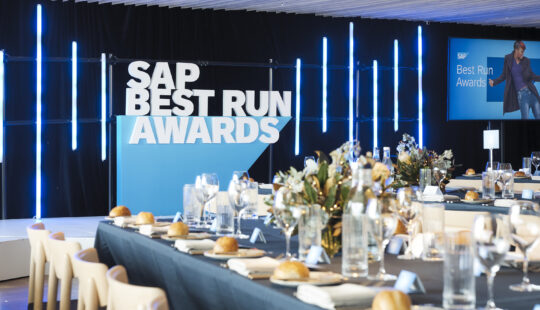The global pandemic has undoubtedly shaken our world. Our approach to just about everything – how we work, in particular – is evolving exponentially, with technology acting as a key catalyst.
The transition – at scale – to remote home offices and virtually connected work has demonstrated the rapid speed at which perceived barriers to bringing about change can and will dissolve. The future of work, as it was being predicted as recently as at the start of 2020, is already here, with some arguing recent events have taken us five to 10 years forward into this future.
So, now that the future of work is simply the present, what’s next? And how can we be better prepared? What are the next big transformative ideas that will drive the evolution of businesses and their employees? What is the role of humans in workplaces that are increasingly augmented by technology? These are a few of the many questions SAP’s chief designer and futurist Martin Wezowski has been exploring for the past six years, and will be sharing at the upcoming innovation experience e’ffect.
“You don’t predict the future. You work for a desirable one.”
Working in the business of predicting tomorrow, one could be forgiven for thinking that Wezowski is a sorcerer of sorts. His presence leaves those he speaks to enchanted by his seemingly supernatural ability to perceive the future. And fundamental to his role at SAP is to channel long-term visions for the future of work to drive strategy and tactically innovate.
The possibilities of tomorrow
For Wezowski, and other leading thinkers like him, his role is not about merely predicting the future, but creating futures.
“Futures are designable – it’s up to you to make them somewhere we want to live in. There is an infinite possibility of things you can do. You don’t predict the future. You work for a desirable one.”
And when it comes to creating what lies ahead, how we redefine work and ensure human relevance alongside other significant disruptions to how we work, such as the rise of artificial intelligence (AI), will be crucial.
Innately human work
A recent global survey by Deloitte found that more than half of the companies surveyed are already starting to use machines to perform tasks previously undertaken by humans. If the trend continues, we will have near-universal adoption of robotic process automation (RPA) within the next five years.
With tantalising benefits such as improved compliance, quality, productivity and cost reduction, it’s clear that automation will play a leading role across sectors to help streamline operations and create greater time efficiencies.
So, what does the role for humans look like against a backdrop of technological progress? Arguably, we must be more emotionally and cognitively agile, which will enable us to achieve a growth mindset; to learn, exchange and discover more. Perhaps, most importantly, it will mean focusing efforts on more meaningful work that adds true value, and which people enjoy doing.
“Humans will focus more and more in the unknown with curiosity and more quality work time on their hands,” Wezowski says.
Indeed, playing, experimenting, imagining and capitalising on our emotional intelligence and contextual knowledge will all prove paramount. These innately human attributes are often exercised, for example, when teams creatively brainstorm for ideas, and these attributes will pave the way to an “empathic symbiosis” with machines, according to Wezowski.
“We need more punk rock in business, man! Let people play and be together,” he says.
“When I hear a start-up say, ‘We will challenge the status quo, do the unusual, go fast and break things’, that sounds like your average punk rock band. But it is also your average curious person.
“Curiosity and creativity are one of the skillsets of this decade. It is not purely engineering – you can read that in a book. Everything you can be instructed on is less important to have in your blood and your education. It’s things you can’t search for online.”
Undertaking laborious and time-consuming tasks will most certainly not be part of the job description.
“SAP’s job is to bring forward high-value work. Artificial intelligence will automate the boring, the repetitive, the insignificant and mundane. Machines will be ever more effective and efficient in the known tasks, the repetitive and predictable.”
To him, traditional manual jobs involving spatial or memory capabilities have the potential to be automated. So too installation and maintenance tasks. Wezowski predicts the management of financial resources, logistics, contracting and other roles within the supply chain will be assumed by algorithms.
With such changes will come opportunities. The “new species” of human will embark on a lifetime of active learning, wherein they’ll employ heavy reasoning, analytical thinking and revel in doing “all the good stuff you love”.
“We need more punk rock in business, man!”
Wezowski envisions designers in politics and philosophers in boardrooms. It will be a place and time where individuality is celebrated for its contribution to work.
“How about acknowledging our differences, our uniqueness as human beings? The 10 billion people living on this planet in 2050 – will we have 10 billion different sets of skills? Yes we will.”
“We will become superhuman because the average will be taken care of by our friends, by technology.”
Not a zero sum game
This perfect marriage with technology and the notion of a future human’s emotional – possibly whimsical – role, sits at odds with the often bleak man versus machine world depicted in sci-fi dystopian blockbusters.
We are now living in an era where advanced robots are the new factory workforce, where self-service checkouts have replaced human till operators and high street travel agents are becoming obsolete. Physicist Stephen Hawking, Microsoft co-founder Bill Gates and Tesla CEO Elon Musk have all warned too that artificial intelligence poses a significant threat to mankind, fuelling fears of job security.
Yet this assumes machine exceptionalism. “Show me a machine that can explore the ideas of how your business should be more relevant and thoughtful, and how you would build better relationships with people you care about,” Wezowski says. In many ways the pandemic has accelerated this trend, by pushing empathy in business to the forefront.
Wezowski argues we must embrace technology wholeheartedly, as innovation will lead to a thriving workforce where “competitiveness is replaced with the complementary”, which will lead to what he calls “completion”.
“[Humans] have a unique contribution to make,” he says, envisaging a future where people are better enabled to discover their unique skillsets, and are able to collaborate with others possessing different strengths.
The “me-we era”
In this era of self-isolation, paradoxically we are already experiencing increased togetherness and teamwork under new guises, as remote working ushers us online and opens digital doors. Never before have we been so accessible, willing to meet the unknown and exchange ideas. We are on the periphery of what Wezowski describes as the “me-we era”, where the focus on the individual evolves and collaboration thrives.
“There is no next big thing; however, there is an infinite amount of things coming together.”
“We have not been human yet. We will become human at last. Because we’ve been busy hunting and gathering and making Excel spreadsheets,” he says. In other words, the true potential of what human workers are capable of has – up until now – been constrained because of the necessary mundanities of modern work.
In the short-term, Wezowski imagines machine learning will improve AI to the point where a system will help monitor your caffeine intake to guarantee you make a better business decision. He anticipates we will adopt visual augmentation devices and several more wearables.
“We will have 20 devices on our bodies that will tell us a little bit better how to be more optimal in each situation we encounter,” he says.
“There is no next big thing; however, there is an infinite amount of things coming together. This is why, at SAP, we are building this one platform, integrating data from sources we could not even imagine into one piece.”
As a futurist, Wezowski’s prophecies are ever-changing, both responding to and reimagining the world. When asked how he deals with decade-long deadlines he says: “I’m quite childish about it, which I think is a great trait in business, because that awakens your curiosity. I sometimes think I work for the NASA of work. We are on the final frontier.”
After all, curiosity is a fundamentally human trait and skill. Embracing it means being open to changes in business operations, processes and even purpose, which will enable businesses to be more resilient because change will be welcomed rather than feared.
Bringing things back to here and now, Wezowski advises: “Build lasting relationships, be a long-term thinker and the rest will follow. That’s your post-Covid agenda”.
Join Martin Wezowski in conversation on the Future of Work at e’ffect at 11am AEST on Thursday, September 17 2020. Register now.
This article was produced for SAP by BBC StoryWorks, the commercial content division of BBC Global News.



